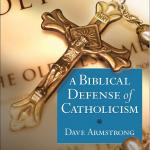
From my book, A Biblical Defense of Catholicism (completed in 1996, published by Sophia Institute Press in 2003; pp. 32-39).
*****
Matthew 5:20 (RSV): “For I tell you, unless your righteousness exceeds that of the scribes and Pharisees, you will never enter the kingdom of Heaven.”
Our Lord here shows us that it is necessary not only to believe in him, but also to keep all the Commandments (as the Pharisees were scrupulous in their observance of Mosaic Law). This standard indicates the very high level of perfection to which we are called. “Faith alone” is refuted.
Matthew 7:16-27: “You will know them by their fruits. Are grapes gathered from thorns, or figs from thistles? So every sound tree bears good fruit; but the bad tree bears evil fruit. A sound tree cannot bear evil fruit, nor can a bad tree bear good fruit. Every tree that does not bear good fruit is cut down and thrown into the fire. Thus you will know them by their fruits. Not every one who says to me, ‘Lord, Lord,’ shall enter the kingdom of Heaven, but he who does the will of my Father who is in Heaven. On that day many will say to me, ‘Lord, Lord, did we not prophesy in your name, and cast out demons in your name, and do many mighty works in your name?’ And then will I declare to them, ‘I never knew you; depart from me, you evildoers.’ Everyone, then, who hears these words of mine and does them will be like a wise man who built his house upon the rock; and the rain fell, and the floods came, and the winds blew and beat upon that house, but it did not fall, because it had been founded on the rock. And everyone who hears these words of mine, and does not do them will be like a foolish man who built his house upon the sand; and the rain fell, and the floods came, and the winds blew and beat against that house, and it fell; and great was the fall of it.”
Jesus puts salvation into very practical terms. He reiterates the teaching of Matthew 5:20 by emphasizing acts of obedience, as opposed to mere verbal proclamations or head knowledge. Even some miraculous works are not necessarily under his superintendence.
A similar dynamic is also present in Matthew 25:31-46, the great scene of the separation of sheep and goats, where Christ continually makes the works of faith the central criterion of judgment. And again in Luke 18:18-25, where the rich young ruler asked Jesus what he must do to inherit eternal life, Jesus asks if he has kept the Commandments. Upon finding out that he has, he commands him to sell all his possessions and give the money to the poor. Jesus was quite an incompetent missionary, according to the pragmatic evangelistic techniques and criteria for “success” which prevail among many of today’s Evangelicals.
Nothing whatsoever is spoken about faith alone in any of these passages, as would be rightfully expected if Luther were correct about the nature of saving faith. All Christians agree that a person living unrighteously is in great danger. Catholics say that such a one has lost the state of grace through mortal sin, whereas most Evangelicals contend that they were likely never saved at all. In any event, the actual outcome is the same in both cases if the sinning persists: hellfire.
Matthew 16:27: “For the Son of Man is to come with his angels in the glory of his Father, and then he will repay every man for what he has done.”
Cardinal Newman comments:
Faith has a certain prerogative of dignity under the Gospel. At the same time, we must never forget that the more usual mode of doctrine both with Christ and His Apostles is to refer our acceptance to obedience to the commandments, not to faith. . . .
There are multitudes who would avow with confidence and exultation that they put obedience only in the second place in their religious scheme, as if it were rather a necessary consequence of faith than requiring a direct attention for its own sake; a something subordinate to it, rather than connatural and contemporaneous with it. . . .
These declarations, [He cites, in addition to Matthew 16:27, 2 Corinthians 5:10, Acts 10:42, James 2:24, and Revelation 22:14] so solemnly, so repeatedly made, must hold good in their plain and obvious sense, and may not be infringed or superseded. [Sermon: “Faith and Obedience,” 1836. All cited Newman sermons can be found in his Parochial and Plain Sermons (San Francisco: Ignatius Press, 1987) and come from his Anglican period
Luke 14:13-14: “But when you give a feast, invite the poor, the maimed, the lame, the blind, and you will be blessed, because they cannot repay you. You will be repaid at the resurrection of the just.”
The idea here appears to be the same one expressed by our Lord in Matthew 16:27: that of differential rewards in Heaven commensurate with deeds done in his grace and with heartfelt devotion.
John 1:29: “Behold, the Lamb of God, who takes away the sin of the world!”
Here we see that sins are obliterated, not merely “covered over.” There are many other passages in the same vein:
2 Samuel 12:13: “The Lord also has put away your sin.”
1 Chronicles 21:8: “Take away the iniquity of thy servant.”
Psalm 51:2, 7, 9-10: “Wash me thoroughly from my iniquity, and cleanse me from my sin! . . . Purge me with hyssop, and I shall be clean; wash me, and I shall be whiter than snow. . . . Blot out all my iniquities. Create in me a clean heart, O God, and put a new and right spirit within me.”
Psalm 103:12: “As far as the east is from the west, so far does he remove our transgressions from us.”
Isaiah 43:25: “I am he who blots out your transgressions for my own sake.”
Isaiah 44:22: “I have swept away your transgressions like a cloud, and your sins like mist, for I have redeemed you.”
Ezekiel 37:23: “I . . . will cleanse them.”
Acts 3:19: “Repent, therefore, and turn again, that your sins may be blotted out.”
1 John 1:7: “The blood of Jesus, his son, cleanses us from all sin.”
1 John 1:9: “He is faithful and just, and will forgive our sins and cleanse us from all unrighteousness.”
The Greek word for “blotted out” in Acts 3:19, exalipho, is used in Revelation 3:5, where names from the book of life are blotted out — obviously an obliteration, with the most dire consequences. In Revelation 7:17 and 21:4, the word has reference to God’s wiping away tears in Heaven: again, clearly an absolute act of removal. Therefore, the notion that the above passages are only metaphorical or symbolic would appear to be a strained and implausible interpretation. The language is so definite as to leave no doubt: sin is taken away, put away, swept away, washed, purged, cleansed, blotted out, or removed.
Likewise, the word for “cleanse” in 1 John 1:7, 9 is katharizo, which is used to describe the cleansing of lepers throughout the Gospels (e.g., Matt. 8:3, 11:5; Mark 1:42; Luke 7:22). This is indisputably an “infused” cleansing, rather than an “imputed” one. Why should God settle for anything less when it comes to our sin and justification?
To be fair, Protestants stress this actual sanctification, as we have already acknowledged, but in separating it in principle, and abstractly, from justification and the “working out” of one’s salvation, they have constructed yet another unnecessary dichotomy, the net result of which has been a lessening of the vital role of works, which thereby tend to be regarded as far less compulsory, to the detriment of holiness.
John 3:36: “He who believes in the Son has eternal life; he who does not obey the Son shall not see life, but the wrath of God rests upon him.”
The Greek word for “believes” is pistuo, and the Greek for “does not obey” is apitheo. There is a parallelism in this verse, whereby belief and obedience are essentially identical. When all is said and done, believing in Christ is obeying him. This ought to be kept in mind by Protestant evangelists and pastors who urge penitents to “believe in Christ,” “accept Christ,” etc. To disobey Christ is to be subject to the wrath of God. Thus, again, we are faced with the inescapable necessity of good works — wrought by God’s grace, and done in the spirit of charity — for the purpose and end of ultimate salvation, holiness, and communion with God.
St. Peter, in 1 Peter 2:7, uses the same parallelism, with the same two identical Greek words (believe/disobedient in KJV). St. Paul uses apitheo with regard to disobedience to parents in Romans 1:30 and 2 Timothy 3:2, and in a more general sense (describing sinners) in Titus 1:16 and 3:3. Obviously, no one disbelieves in the existence of his parents. St. Paul is speaking of disobeying parents’ commands. In the same sense, such disobedience (not mere lack of faith) is said to be the basis of the loss of eternal life in John 3:36.
To speculate further, if it be granted that pistuo (“believe”) is roughly identical to “obeying,” as it indisputably is in John 3:36, by simple deduction, then its use elsewhere is also much more commensurate with the Catholic view of infused justification rather than the more abstract, extrinsic, and forensic Protestant view; for example, the “classic” Protestant evangelistic verse John 3:16, Jesus’ constant demand to believe in him in John 5 through 10, and St. Paul’s oft-cited salvific exhortations in Romans 1:16, 4:24, 9:33, and 10:9, generally thought to be irrefutable proofs of the Protestant viewpoint on saving faith.
John 6:27-29: “Do not labor for the food which perishes, but for the food which endures to eternal life, which the Son of man will give to you; for on him has God the Father set his seal. Then said they to him, ‘What must we do, to be doing the works of God?’ Jesus answered them, ‘This is the work of God, that you believe in him whom he has sent.’ ”
In verses 28 and 29, working and belief in Christ are equated, much like obedience and belief in John 3:36. In the marvelous phrase “doing the works of God,” we see that our works and God’s are intertwined if indeed we are doing his will. This is the Catholic viewpoint: an organic connection of both faith with works, and God’s unmerited grace coupled with our cooperation and obedience. Our Lord constantly alludes to the related ideas of reward and merit, which are complementary: Matthew 5:11-12, 6:3, 18, 10:42, 12:36-37, 25:14-30; Luke 6:35, 38; 12:33. St. Paul, using the same word for “works” (ergon), speaks in Acts 26:20 of the process of repenting, turning to God, and doing deeds worthy of their repentance. In other words, they will thus prove their repentance by their deeds.
Acts 10:31: “Cornelius, your prayer has been heard, and your alms have been remembered before God.”
Acts 10:35: “But in every nation anyone who fears him and does what is right is acceptable to him.”
The Gentile Cornelius is told by an angel that his alms (works done in faith) put him in good stead with God vis-à-vis becoming a Christian. Later, St. Peter reiterates this by stating that whoever “fears him and does what is right” is accepted by God; that is, both faith and allegiance must be present. The ongoing principle of the organic closeness of faith and works is again evident.
Acts 22:16: “ ‘And now, why do you wait? Rise and be baptized, and wash away your sins, calling on his name.’ ”
Cardinal Newman comments on this verse:
A man may . . . [think] that in St. Paul’s Epistle to the Romans nothing is said about channels and instruments; that faith is represented as the sole medium of justification. . . . Yet from other parts of the history, we learn . . . that an especial revelation was made to Ananias, lest Saul should go without Baptism; and that, so far from his being justified immediately on his faith, he was bid not to tarry, but “to arise and be baptized, and to wash away his sins….”
Here, then, we have a clear instance in St. Paul’s case, that there are priestly services between the soul and God, even under the Gospel; that though Christ has purchased inestimable blessings for our race, yet that it is still necessary ever to apply them to individuals by visible means. [Sermon: “The Christian Ministry,” 1835]
The Protestant has difficulty explaining this passage, for it is St. Paul’s own recounting of his odyssey as a newly “born-again” Christian. We have here the Catholic doctrine of (sacramental) sanctification/justification, in which sins are actually removed. The phraseology “wash away your sins” is reminiscent of Psalm 51:2, 7; 1 John 1:7, 9; and similar texts dealing with infused justification, dealt with earlier. We note also a similarity to St. Peter’s first sermon in the Upper Room upon being filled with the Holy Spirit:
Acts 2:38: “Repent, and be baptized, every one of you, in the name of Jesus Christ for the forgiveness of your sins; and you shall receive the gift of the Holy Spirit.”
According to the standard Evangelical soteriology, the apostle Paul would have been instantly “justified” at the Damascus-road experience when he first converted (almost involuntarily!) to Christ (Acts 9:1-9). Thus, his sins would have been “covered over” and righteousness imputed to him at that point. If so, why would St. Paul use this terminology of washing away sins at Baptism in a merely symbolic sense (as they assert), since it would be superfluous? The reasonable alternative, especially given the evidence of other related scriptures, is that St. Paul was speaking literally, not symbolically.
***
Photo credit: Christ and the Rich Young Ruler, 1889, by Heinrich Hofmann (1824-1911) [public domain / Wikimedia Commons]
***













